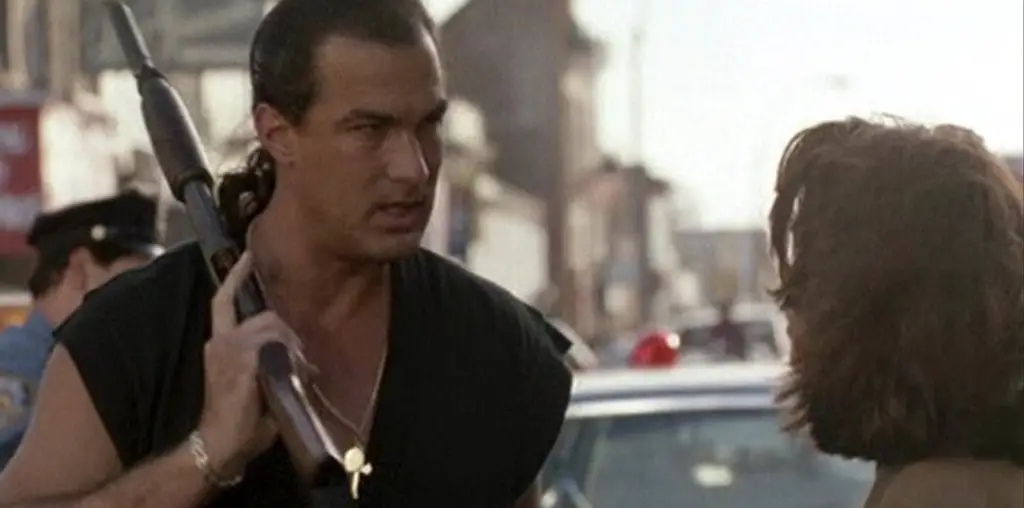
Molotov Mitchell’s Gates of Hell falls into what is often referred to as a mockumentary, in that it is a fake documentary used to tell a narrative tale in a more realistic way. However, the word “mock,” in the commonly accepted cinematic terminology, a la Christopher Guest comedy, seems incorrect and inappropriate here. “Mock” might lead you to believe that you’re in for something light and easy to digest, but in truth the film couldn’t be more challenging. Instead, regardless of where you fall along the political arguments or sentiments expressed in the film, you’re in for a powerful experience.
The main premise of Gates of Hell is that it is a documentary made in 2016 by a Finnish filmmaker, Ani Juva (Hanna Salo), who is trying to make sense of why her son, Lars, is playing a first person shooter video game where he takes on the role of a member of the Zulu 9, an African American terrorist organization that’s main goal is to stop abortions, a form of what they call “Black Genocide,” by murdering abortionists. Ani wants to know how this group, known for their violent tactics and assassinations, made the mark they did on society, the culmination of which is the banning of abortion in 40 out of 50 states in the United States.
Thus the film proceeds like a normal documentary, with all the professional polish one would expect from a top-notch doc production, as Ani explores the story of the Zulu 9, their ideology and their actions. In the world of the film, the Zulu 9 recorded all their abortionist assassinations and uploaded the videos online, so beyond talking head interviews and news coverage, Gates of Hell also shows the brutality of the group, in as real a fashion as possible.
Sometimes it’s simple handheld footage where you imagine the captive cameraman, played by Molotov Mitchell, is just running along with the group filming things. Other times, the camera is mounted to the guns, giving much the same perspective as the view that would later become commonplace in the video game based on the Zulu 9. Even in those stylized shots, however, the film never gives the sense that it is glorifying the violence it is showing; instead the violence is raw, ugly and matter-of-fact.
And the result is, as expressed earlier, powerful and challenging. For one, the film is so strong in its scope that, at times, you’re not sure if the film is making a statement about abortion, the definition of terrorist groups, the way we champion or not champion questionable heroes, violent or non-violent acts of protest, government, pro or anti-gun control, militias, documentary filmmaking and/or the role of art in exploring polarizing conversations and ideas. Some of these? All of these? None of these?
Because the most pedestrian interpretation of the film is to take the fictionalized world of the future, as presented here, and look at it as the hope of the present day faux-documentary filmmakers. And maybe there is some truth to that, and the film definitely leans in favor, maybe not so much in how the Zulu 9 affect change but in that they did affect change, and that a banning of abortions is the result. But I think that sells the film short just to dismiss it as anti-abortion or pro-violent acts of protest. Instead, I see the film as a funhouse mirror of sorts, encompassing all the tricks and arguments of modern day documentary filmmaking to showcase a scenario when those same tricks and arguments could just as easily be utilized to make the opposite point.
For example, in this film, the outcry that moves states to ban abortions involves the assassination of a senator who was not supportive of Zulu 9 so much as not condemning of their actions. Meanwhile, the Zulu 9 are assassinating abortionists in cold blood, but there seems to be little outcry there, save in law enforcement circles. I could just as easily see a film made where the Zulu 9’s actions make people sympathetic to the abortionists, and things roll in the opposite direction. That’s not the world being explored here, and the filmmakers chose this view for a reason, but it could’ve been.
Therefore, I can’t boil this down to being a simple message. You maybe could call it pro-life, anti-abortion but I think the film involves too many different ideas and scenarios to just put it in one little box. It’s art, and it’s making a number of statements in a realistic way utilizing a reality that doesn’t currently exist. It’s subversive and provocative, and it’s going to piss off a lot of people for various reasons, but that’s not a bad thing. Again, regardless of where you stand politically, this is a powerful film that challenges you and makes you think. Might not change your mind one way or another, but it will make you contemplate where you stand and why.
This film was submitted for review through our Submission for Review system. If you have a film you’d like us to see, and we aren’t already looking into it on our own, you too can utilize this service.
